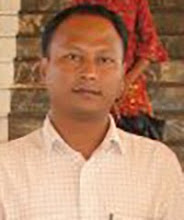Ledi Sayadaw
Mahathera, Agga Maha Pandita, D.Litt.
(1846-1923)
( As published in 'The Manual of Buddhism', Union Buddha Sasana Council, Burma, 1965 )
Known to scholars of many countries, the Venerable Ledi Sayadaw, Aggamahapandita, D.Litt., was perhaps the outstanding. Buddhist figure of this age. With the increase in interest in Western lands, there is a great demand for his Buddhist Discourses and writings which are now being translated and reproduced in "The Light of the Dhamma."
Bhikkhu Nyana who was later known as Ledi Sayadaw was born on Tuesday, the 13th Waxing of Nattaw, 1208 Burmese Era (1846 C.E.) at Saing-pyin Village, Dipeyin Township, Shwebo District. His parents were U Tun Tha and Daw Kyone. Early in life he was ordained a samanera and at the age of 20 a Bhikkhu, under the patronage of Salin Sayadaw U Pandicca. He received his monastic education under various teachers and later was trained in Buddhist literature by the Venerable San-kyaung Sayadaw, Sudassana Dhaja Atuladhipati Siripavara Mahadhamma Rajadhi-raja-guru of Mandalay.
He was a bright student. It was said of him:—"About 2000 students attended the the lectures delivered daily by the Venerable San-kyaung Sayadaw. One day the Venerable Sayadaw set in Pali 20 questions on Parami (Perfections) and asked all the students to answer them. None of them except Bhikkhu Nyana could answer those questions satisfactorily." He collected all these answers and when he attained 14 Vassa and while he was still in San-kyaung monastery, he published his first book, "Parami Dipani". ((Manual of Perfections).
During the reign of King Theebaw he became a Pali lecturer at Maha Jotikarama monastery in Mandalay. A year after the capture of King Theebaw, i.e. in 1887 C.E, he removed to a place to the north of Monywa town, where he established a monastery under the name of Ledi-tawya Monastery. He accepted many bhikkhus-students from various parts of Burma and imparted Buddhist education to them. In 1897 C.E., he wrote Paramattha Dipani (Manual of Ultimate Truths) in Pali.
Later, he toured in many parts of Burma for the purpose of propagating the Buddha Dhamma. In towns and villages he visited he delivered various Discourses on the Dhamma and established Abhidhamma classes and Meditation Centres. He composed Abhidhamma rhymes or Abhidhamma Sankhitta and taught them to his Abhidhamma classes. In some of the principal towns he spent a Vassa imparting Abhidhamma and Vinaya education to the lay devotees. Some of the Ledi Meditation Centres are still existing and still famous. During his itinerary he wrote many essays, letters, poems and manuals in Burmese. He has written more than 70 manuals, of which eight have been translated into English and published in "The Light of the Dhamma". Vipassana Dipani (Manual of Insight) was translated by his disciple Sayadaw U Nyana, Pathamagyaw Patthanuddesa Dipani (A concise exposition of the Buddhist Philosophy of Relations) was originally written in Pali by the late Ledi Sayadaw and translated by Sayadaw U Nyana. Niyama Dipani (Manual of cosmic Order) was translated by U Nyana and Dr. Barua and edited by Mrs. Rhys Davids. Sammaditthi Dipani (Manual of Right Understanding) and Catusacca Dipani (Manual of the Four Noble Truths) were translated by the Editors of "The Light of the Dhamma." Bodhipakkhiya Dipani (Manual of the Factors Leading to Enlightenment) was translated by U Sein Nyo Tun, I.C.S. (Retd.), and Magganga Dipani (Manual of the constituents of the Noble Path) was translated by U Saw Tun Teik. B.A. B.L., and revised and edited by the English Editorial Board of the Union Buddha Sasana Council.
He was awarded the title of Aggamaha pandita by the Government of India in 1911 C.E. Later, the University of Rangoon conferred on him the degree of D. Litt. (Honoris Causa). In the later years he settled down at Pyinmana where he died in 1923 C.E. at the ripe age of 77.








|